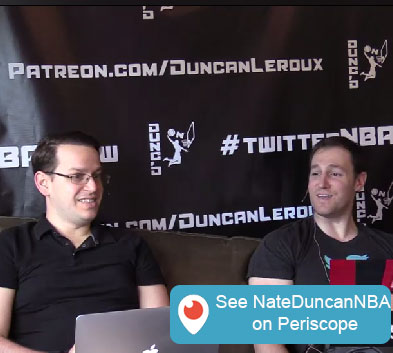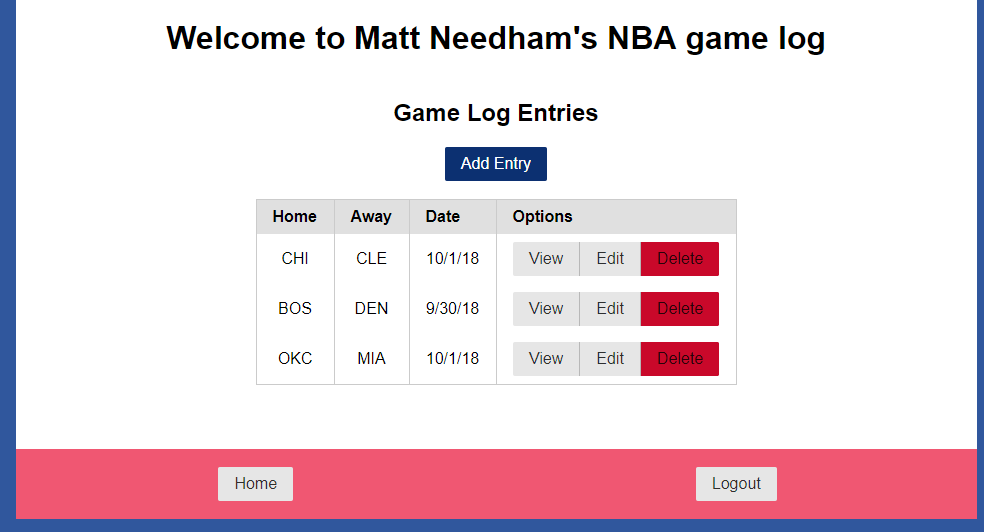Around this time last year, I attempted to predict how many games each NBA team would win. I am hoping to do the same this year but before I do so I want to evaluate my predictions from last year. My model was primarily built using previous season
win shares. One consistent flaw I found in my predictions was that I tended to underestimate the performance of team with promising young players. This makes sense because young players have the greatest potential to improve. A few other big misses were due to injuries, especially teams that choose to tank* after a star player was injured.
The number after each team is how the team fared compared to my prediction. For example, the Golden State Warriors won 9 fewer games than I predicted, 58 as compared to 67.
Golden State Warriors (-9) I don’t feel too bad about missing on this one. I think the Warriors could have won a handful more games, but they took their foot off the gas pedal to prioritize the playoffs. Given how the Rockets won more games but Chris Paul got hurt in the Western Conference finals, I can’t criticize that strategy.
Cleveland Cavaliers (-12) This prediction looks awful in retrospect. I did not expect much drop off from Isaiah Thomas but that was clearly a mistake. Not only did he miss much of the season recovering from injury, when he did return he was a much worse player.
Minnesota Timberwolves (-13) I noted at the time this was probably showing a flaw in my model and I think that’s clear as day now. Andrew Wiggins regressed, which is a worrying sign that he played worse alongside Jimmy Butler. While Jeff Teague had a worse season than I expected, I think that was on me more than Teague. His year with Indiana the season before was clearly an aberration. For veteran players, my model could be improved by moving to a multi-year win shares average.
Houston Rockets (+2) Their big move was adding Chris Paul and he added about as much value as I expected. The question was would Harden & Paul be able to coexist without dropping off and it looks like they actually improved their individual production a bit. I wonder how much of this is due to their strategy of successfully playing lots of isolation basketball.
Oklahoma City Thunder (-5) This was an alright prediction. I thought it was the Knicks holding Carmelo back over the past few years, but he was a net negative even on the Thunder. I expect the Thunder to be a few games better with him off the roster this year.
San Antonio Spurs (-3) While my prediction looks close here, I’m shocked. My prediction certainly did not account for Kawhi Leonard missing most of the season. Where did they make up the production? A better season for LaMarcus Aldridge as well as a breakout year for Kyle Anderson. It also helps they continue to be the Spurs and put out the 3rd best defense in the league.
Washington Wizards (-5) I initially guessed I overestimated wins for the Wizards due to John Wall’s injury but they played fine without him. It was actually Marcin Gortat who under performed most severely and Bradley Beal was a bit worse than I expected.
Toronto Raptors (+11) One of many underestimates where I did not properly account for strong contributions from young players. For the Raptors that was Jakob Poeltl, Pascal Siakam, and Fred VanVleet.
Boston Celtics (+7) The accuracy of my prediction here is similar to the Raptors (underestimated young talent) and the Spurs (worse than it looks considering Gordon Hayward was hurt all season). The young players I underestimated the most were Jayson Tatum, Terry Rozier, and Jaylen Brown. Look for those players to get even better next year and they’ll add Hayward back in.
Denver Nuggets (-1) Nearly perfect!
Utah Jazz (+5) The main variable I missed here was Donovan Mitchell. I expected him to be your average rookie guard which is a slight negative but he was phenomenal for Utah.
Charlotte Hornets (-7) Dwight Howard was a disaster for the Hornets. I’ll need to keep an eye out for players who put up big stats in bad situations, like Howard did in the previous season.
Miami Heat (+1) Nearly perfect!
New Orleans Pelicans (+6) Two things happened here. First, the pairing of Anthony Davis and DeMarcus Cousins worked out better than I expected (and the Pelicans’ pickup of Nikola Mirotic when Cousins tore his Achilles tendon worked out nicely). Second, I did not factor in Jrue Holiday missing most of the previous season and he had a great bounce back year.
Milwaukee Bucks (+3) I had high expectations for Giannis Antetokounmpo which he met, but it was the mid-season trade for Eric Bledsoe that improved this team beyond my expectations.
Los Angeles Clippers (+4) There was no clear pattern to my under estimation here. As far as I can tell, Doc Rivers did a fine job coaching this team and getting a little bit more than expected out of each player.
New York Knicks (-8) The Knicks were exactly on pace to win my predicted 37 games until star Kristaps Porzingis tore his ACL on February 6th. After that, the Knicks accepted their fate and attempted to make a late entry into the tankathon.
Dallas Mavericks (-12) While I expected the Mavericks to be a middle of the road team, instead they
embraced tanking to the fullest extent. This made it easy to play a rookie at point guard, always a losing option, and to not be too torn over the loss to injury of Seth Curry.
Philadelphia 76ers (+17) This was my worst prediction (Chris Freiman if you’re reading this, you were right!) They had a few things going for them. First, Ben Simmons was a massive value-add player for them when merely being positive is an accomplishment for a rookie. Second, Joel Embiid played many more games than I expected. Third, some other young players like Dario Saric and Robert Covington took nice steps forward. Fourth, in a similar fashion to the Clippers, essentially everybody on this roster had a slightly better season than my model expected. Credit Brett Brown for that one.
Portland Trailblazers (+14) I thought Evan Turner would be a negative for this team but he was (barely) a positive contributor. I thought Damian Lillard would be really, really good but he was really, really, really good. Ed Davis took a much larger step forward than I expected and Jusuf Nurkic seems to fit in much better in Portland than he did in Denver.
Detroit Pistons (+5) When the Pistons traded for Blake Griffin, it gave them a boost in the short term. They did a little bit better than expected but it still was not enough to make the playoffs. How much will the Griffin trade hurt them in the long term?
Indiana Pacers (+15) I completely missed on this prediction but so did everybody else watching the NBA. The big story here was Victor Oladipio’s meteoric rise from alright backup in OKC to all-star in Indiana.
Memphis Grizzlies (-10) The Grizzlies’ season was similar to that of the Knicks. When star Mike Conley got hurt early in the season it became clear the team needed to tank. Conley played so few games I can’t really extrapolate based on the time he was healthy.
Orlando Magic (-6) This was a surprise for me: my model had very high expectations for Mo Speights. He had a steep drop off from one of his best seasons ever last year in Los Angeles. The Magic, unsurprisingly, were also tankathon competitors.
Phoenix Suns (-8) I’m not too upset about missing on a team that won the tankathon, but I will note that trading Eric
“I Dont wanna be here” Bledsoe was a significant contributing factor.
Atlanta Hawks (-3) The Hawks were bad, as expected.
Brooklyn Nets (+2) The Nets were bad, as expected.
Sacramento Kings (+2) The Kings were bad, as expected.
Chicago Bulls (+3) The Bulls were bad, as expected.
Los Angeles Lakers (+12) To close out this analysis, I really need to do a better job of projecting youth-heavy teams (see also 76ers, Raptors, Celtics). Kyle Kuzma and Josh Hart were much better than I expected. An interesting note is that I have Julius Randle as their most impactful player last year but they let him leave for New Orleans.
*If you are you are reading this but don’t follow the NBA closely, “tankathon” refers to how many NBA teams “tank” (not sure where the term came from, but it means purposefully put out a poor team to work towards a losing record). So many teams were doing this last season in the hopes of getting a better draft pick that it became a bit of a “tankathon”, a contest to see who could tank the strongest.






